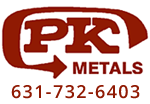Check out our blog on Forbes.com
What do you do with outdated electronics? Businesses and consumers ask themselves that question every day. Technology is advancing so rapidly that electronic equipment can become outdated and inefficient at a much faster pace. Recycling outdated computers is an immediate step that every business can take to improve their carbon footprint. At PK Metals, we take pride in our R2/RIOS certification, and work with our customers and vendors to ensure that e-waste is handled properely.
To answer this question, we reached out to Robert Erie CEO of E-World . Founded in 2006 E-World Recyclers, and its sister Company E-World Online is one of the leaders in educating businesses and consumers about how to properly recycle their end of life devices. In 2012 E-World Online is responsible for coordinating efforts to recycle over 70 million pounds of electronics in 25 states. E-World has partnered with15 manufacturers to assist with Extended Producer Responsibility (EPR) regulatory mandates.
If I am a company that is getting ready to update a 500 unit computer system, what should I do?
To be sure your material is handled appropriately; we recommend you contact an electronics recycler with third party certification. Like most businesses today electronics recyclers are increasingly seeking to be more environmentally compliant. Compliance certifications have become a standard requirement due to various privacy protection acts such as HIPPA, FACTA, and others. Today there are several standards specific to our industry such as E-Stewards and R2. These accredited certification programs give consumers and businesses the assurance that their used electronics will be handled in a safe and environmentally responsible way. E-World Onlne has created the nations largest network of recyclers, all of which have achieved this higher standard of certification. We have recently instituted a zip code locator in cooperation with Earth 911, which includes a consumer database of 22,000 drop off locations, to make recycling easy, cost effective, and convenient for all consumers. In most cases, depending upon area served, recyclers are willing to remove the material at no cost.
What happens to computers and servers once they enter your facilities?
In the case of most electronics recycling facilities, material from inbound loads is first staged, then sorted, segregated, and separated into streams of raw materials. These would include steel, plastic, copper, glass etc. Once separated these streams are fed through various types of size reduction equipment and sold into the commodity markets. Working units and items that may be refurbished or repaired will be separated. Despite their differences, most electronic devices tend to have many similar parts such as memory, CPU’s, video cards, network cards etc. When units are dismantled these parts can be collected and sold into various refurbishing and reuse markets. For instance most electronic devices have a plastic housing or case. These are removed and the plastics are sorted by type and color and baled for reuse in the manufacturing of new products. In other instances, many of the older computers contain reasonable amounts of precious metals such as gold, silver, and palladium. These parts are sent of to refineries and smelters who are able to recapture these valuable items
How do companies know their data will be destroyed when their machines are recycled?
There are a number of ways to erase, destroy, or eradicate data, which may be contained on computers hard drive or other data containing device or DCD. This is a very sensitive subject, and definitely something you should ask your recycler about. A reputable recycler will be able to give you the details of their data destruction policies and procedures. Data destruction processes may range from software based data wiping to the physical destruction and shredding. How can you tell if a recycler has the proper licensing to handle E-Waste?
Ask them to see their Environmental Health and Safety Management System (EHSMS) and/or any certifications that they may have. In todays day and age, certifications and standards for electronic recyclers has reached an all time high. Any “proper” recycling facility will know exactly what you are asking for, because certification and compliance in the e-waste industry has become a common theme. In most cases their facilities will be subject to an annual inspections audits, and verifiable proof that they are handling things in an environmentally sound manner. Although there is not an E-Waste “licensing process”, 2 “certification standards” do exist. E-Stewards and R2 accreditations are awarded to recyclers, which exhibit responsible disposal methods.
How has globalization impacted the E-Waste business?
While relatively new, and admittedly far from being perfect, E-waste recycling is now a sustainable worldwide industry. It spares hazardous materials from polluting the environment in which we live. It saves us from having to continue to mine the limited amount of raw materials from this planet; therefore it also conserves energy and natural resources. It has created thousands of jobs, in dozens of countries while being an environmental benefit to all. Because reuse is such a major part of recycling globalization has allowed 3rd world nations access to computer equipment as well as global Internet access, networking connectivity, and technological opportunities that they never would have been able to afford. Ironically, we are still only in the infancy stages, so its only going to grow.
E-Waste has become a big export for the United States. Where are you seeing the most demand?
There is demand for export – but not necessarily on the “waste” side of the business. The export demand seems more geared toward reusable equipment or equipment that can be refurbished, fixed, resold, and reused. Countries like China,Malaysia, andIndia, Indonesia etc.. who have cheaper labor rates, and who manufacture the original equipment to begin with, are likely choices of where to send the materials to be repaired and refurbished. There has also been a demand for the materials streams derived from ewaste recycling.
How has E-World Online managed to secure so many global partnerships with major companies?
E-World online has taken a unique approach to solving the ever growing ewaste recycling challenge. There is no single company in the world that can handle this ewaste stream, at the rate it is growing, so we have to work together to handle this challenge. E-World Online has focused on building a recycling network and not a recycling company. This network of companies is all working together for one common goal. To be a benefit to the environment, as well as the society we all live in, today, tomorrow and for generations to come.
For more information about E-World, check out their website eworldrecyclers.com
For more information about E-Green Recycling Management, check out our website egreenrecyclingmanagement.com






